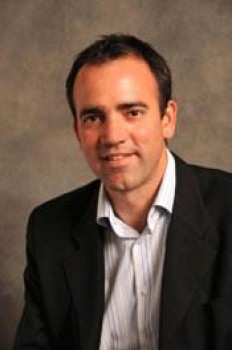Events
Prof. Rein Ulijn, Adaptive Nanotechnology through Molecular Networks

Prof. Rein Ulijn
| Date: | Wednesday 23 October 2013 15:00 - 16:00 |
| Location: | The People's Palace - PP1 |
Prof. Rein Ulijn, Department of Chemistry, University of Strathclyde
SEMS/IoB Seminar Series
Coffee/tea/biscuits provided after the seminar
It is our vision to develop materials and systems that are inspired by the adaptive properties of living systems but are accessible to chemists and may be exploited in technological and biomedical applications. Existing stimuli-responsive nanomaterials and molecules are usually only able to respond to an applied stimulus in a binary (ON/OFF) manner. It is clear that biological, ecological systems operate differently. They achieve functionality and responsiveness as a cumulative result of complex molecular interactions that are highly dynamic resulting in an ability to respond in many different ways to applied stimuli.
We use designed peptides to achieve key molecular functions necessary for adaptive systems (in particular, catalysis, self-assembly and molecular recognition). We have demonstrated that it is possible to achieve molecular recognition and catalysis, as well as self-assembly based on short peptide chains. We have made significant progress in enhancing the understanding of how catalysis and molecular self-assembly can be linked to produce adaptive and selective systems. By combining catalytic exchange of components with self-assembly, it will be possible to study the interplay of components, and discover the “emergent” properties that such minimal nanoscale molecular systems’ may express. The next challenge in this area is now to develop systems that operate far from equilibrium and are responsive to temporary changes in the environment. We are interested in various environmental stimuli but also physical triggers such as pressure waves and even audible sound.
We believe that the development of adaptive molecular nanotechnologies would provide new ways to measure, influence and ultimately direct complex molecular ecosystems, such as those found in biology with tremendous opportunities in the development of new, disruptive technologies in a range of areas (nanomedicine, environmental technologies, functional foods, etc.).

